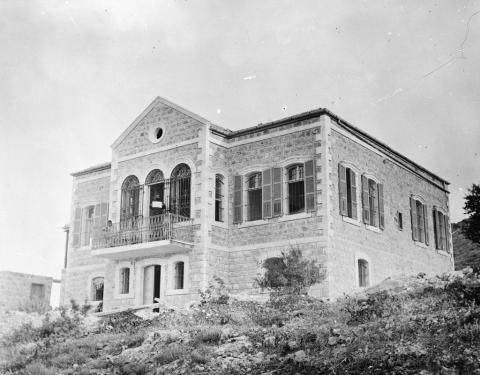‘Abdu’l-Ghaffar [one of the four companions condemned to go with Mirza Yahyá to Cyprus] was a close and agreeable companion. He served as interpreter for the entire company, for he spoke excellent Turkish, a language in which none of the friends was proficient . . . He was terrified and shouted for help, for he longed to be with us in the Most Great Prison. When they held him back by force, from high up on the ship he threw himself into the sea. This had no effect whatever on the brutal officers. After dragging him from the water they held him prisoner on the ship, cruelly restraining him, and carrying him away by force to Cyprus. He was jailed in Famagusta, but one way or another managed to escape and hastened to 'Akká. Here, protecting himself from the malevolence of our oppressors, he changed his name to ‘Abdu’l-lah. Sheltered within the loving-kindness of Bahá’u’lláh, he passed his days at ease, and happy. But when the world's great Light had set, to shine on forever from the All-Luminous Horizon, ‘Abdu’l-Ghaffar was beside himself and a prey to anguish. He no longer had a home. He left for Damascus and spent some time there, pent up in his sorrow, mourning by day and night. He grew weaker and weaker. We despatched Haji Abbas there, to nurse him and give him treatment and care, and send back word of him every day. But ‘Abdu’l-Ghaffar would do nothing but talk, unceasingly, at every hour, with his nurse, and tell how he longed to go his way, into the mysterious country beyond. And at the end, far from home, exiled from his Love, he set out for the Holy Threshold of Bahá’u’lláh. He was truly a man long-suffering, and mild; a man of good character, good acts, and goodly words. Greetings and praise be unto him, and the glory of the All-Glorious. His sweet-scented tomb is in Damascus.
Self Pity
Among the women who came out of their homeland was the sorrowing Fatimih Begum, widow of the King of Martyrs. She was a holy leaf of the Tree of God. From her earliest youth she was beset with uncounted ordeals. First was the disaster which overtook her noble father in the environs of Badasht, when, after terrible suffering, he died in a desert caravanserai, died hard -- helpless and far from home. The child was left an orphan, and in distress, until, by God's grace, she became the wife of the King of Martyrs. But since he was known everywhere as a Bahá’í, was an impassioned lover of Bahá’u’lláh, a man distracted, carried away, and since Násiri'd-Dín Sháh thirsted for blood -- the hostile lurked in their ambush, and every day they informed against him and slandered him afresh, started a new outcry and set new mischief afoot. For this reason his family was never sure of his safety for a single day, but lived from moment to moment in anguish, foreseeing and dreading the hour of his martyrdom. Here was the family, everywhere known as Bahá’ís; their enemies, stony-hearted tyrants; their government inflexibly, permanently against them; their reigning Sovereign rabid for blood. It is obvious how life would be for such a household. Every day there was a new incident, more turmoil, another uproar, and they could not draw a breath in peace. Then, he was martyred. The Government proved brutal and savage to such a degree that the human race cried out and trembled. All his possessions were stripped away and plundered, and his family lacked even their daily bread. Fatimih spent her nights in weeping; till dawn broke, her only companions were tears. Whenever she gazed on her children, she would sigh, wearing away like a candle in devouring grief. But then she would thank God, and she would say: "Praised be the Lord, these agonies, these broken fortunes are on Bahá’u’lláh's account, for His dear sake." She would call to mind the defenseless family of the martyred Husayn, and what calamities they were privileged to bear in the pathway of God. And as she pondered those events, her heart would leap up, and she would cry, "Praise be to God! We too have become companions of the Prophet's Household." Because the family was in such straits, Bahá’u’lláh directed them to come to the Most Great Prison so that, sheltered in these precincts of abounding grace, they might be compensated for all that had passed. Here for a time she lived, joyful, thankful, and praising God. And although the son of the King of Martyrs, Mirza ‘Abdu’l-Husayn, died in the prison, still his mother, Fatimih, accepted this, resigned herself to the will of God, did not so much as sigh or cry out, and did not go into mourning. Not a word did she utter to bespeak her grief. This handmaid of God was infinitely patient, dignified and reserved, and at all times thankful. But then Bahá’u’lláh left the world, and this was the supreme affliction, the ultimate anguish, and she could endure no more. The shock and alarm were such that like a fish taken from the water she writhed on the ground, trembled and shook as if her whole being quaked, until at last she took leave of her children and she died. She rose up into the shadowing mercy of God and was plunged in an ocean of light. Unto her be salutations and praise, compassion and glory. May God make sweet her resting-place with the outpourings of His heavenly mercy; in the shade of the Divine Lote-Tree [1] may He honor her dwelling.
